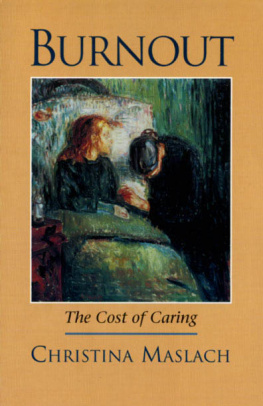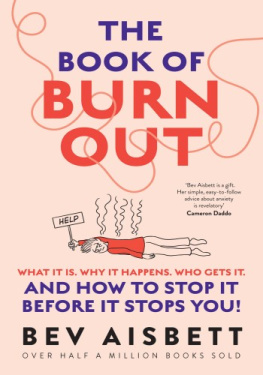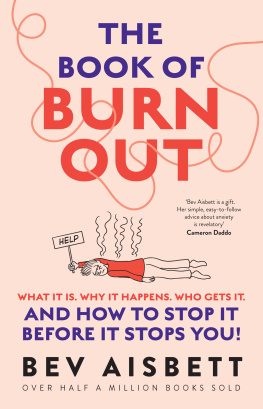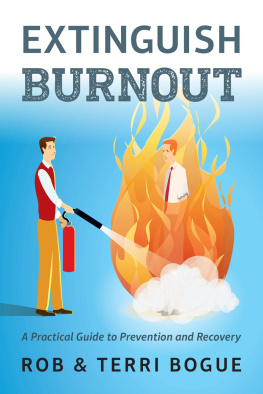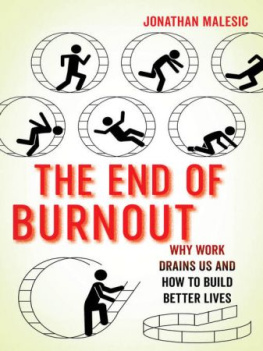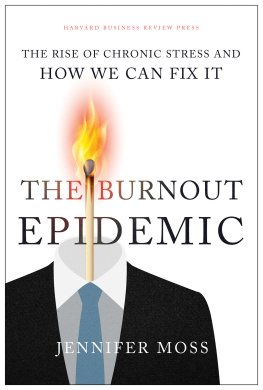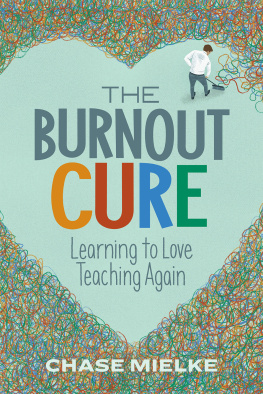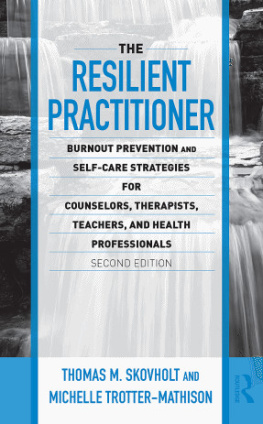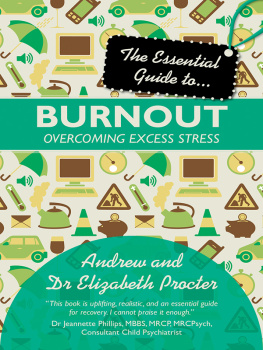Christina Maslach - Burnout: The Cost of Caring
Here you can read online Christina Maslach - Burnout: The Cost of Caring full text of the book (entire story) in english for free. Download pdf and epub, get meaning, cover and reviews about this ebook. year: 2003, publisher: Institute for the Study of Human Knowledge, genre: Politics. Description of the work, (preface) as well as reviews are available. Best literature library LitArk.com created for fans of good reading and offers a wide selection of genres:
Romance novel
Science fiction
Adventure
Detective
Science
History
Home and family
Prose
Art
Politics
Computer
Non-fiction
Religion
Business
Children
Humor
Choose a favorite category and find really read worthwhile books. Enjoy immersion in the world of imagination, feel the emotions of the characters or learn something new for yourself, make an fascinating discovery.
- Book:Burnout: The Cost of Caring
- Author:
- Publisher:Institute for the Study of Human Knowledge
- Genre:
- Year:2003
- Rating:4 / 5
- Favourites:Add to favourites
- Your mark:
- 80
- 1
- 2
- 3
- 4
- 5
Burnout: The Cost of Caring: summary, description and annotation
We offer to read an annotation, description, summary or preface (depends on what the author of the book "Burnout: The Cost of Caring" wrote himself). If you haven't found the necessary information about the book — write in the comments, we will try to find it.
This book shows how to recognize, prevent and cure burnout syndrome for nurses, teachers, counselors, doctors, therapists, police, social workers, and anyone else who cares about and for people.
Burnout: The Cost of Caring — read online for free the complete book (whole text) full work
Below is the text of the book, divided by pages. System saving the place of the last page read, allows you to conveniently read the book "Burnout: The Cost of Caring" online for free, without having to search again every time where you left off. Put a bookmark, and you can go to the page where you finished reading at any time.
Font size:
Interval:
Bookmark:
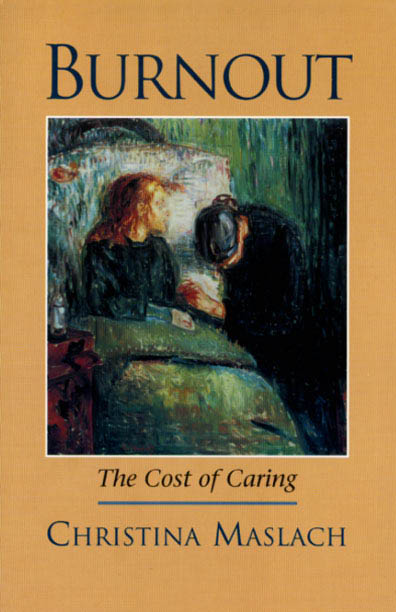
To my parents, George J. Maslach and Doris C. Maslach, whose love and caring have meant so much to me.
This is a MALOR BOOK
Published by ISHK
P.O. Box 176
Los Altos, CA 94023
Copyright 2003 by Christina Maslach
All rights reserved under
International and Pan-American Copyright Conventions.
Cover image: The Sick Child by Edvard Munch 2003 The Munch Museum / The Munch-Ellingsen Group / Artists Rights Society (ARS), NY
Library of Congress Cataloging-in-Publication Data
Maslach, Christina. [Burnout, the cost of caring] Burnout: the cost of caring / Christina Maslach ; prologue by Philip G.
Zimbardo. p. cm.
Originally published: Burnout, the cost of caring. Englewood Cliffs, N.J. Prentice-Hall, c 1982
Includes bibliographical references and index. ISBN 1-883535-35-9 (alk. paper)
1. Bum out (Psychology) I. Title.
BF481.M384 2003 158.723-dc21
2003051135
The publisher is grateful to The Will J. Reid Foundation for its generous grant supporting the reprinting of this book.
ABOUT THE AUTHORS
Now regarded as a leading authority in her field, CHRISTINA MASLACH was one of the first psychologists to explore the burnout phenomenon. She holds a Ph.D. in social psychology from Stanford University and is a professor and Vice Provost for Undergraduate Education at the University of California at Berkeley. In addition to teaching, she has done extensive research on the subject of burnout and has written several books and many articles in such publications as Psychology Today.
PHILIP G. ZIMBARDO, author of the prologue, is a professor of psychology at Stanford University and has written many books, including the bestseller Shyness, The Shy Child (also published by Malor Books) and Psychology and Life.
CONTENTS
ACKNOWLEDGMENTS
Many people have played important roles in this analysis of burnout. Foremost among them is Susan E. Jackson, who has collaborated with me on numerous research studies and on the development of the Maslach Burnout Inventory. She is a superb researcher, a wonderful colleague, and a good friend and I am deeply grateful for all that she has done. I also want to give a special thanks to the people who helped me begin this research: Kathy Kelly Moore, who first discovered burnout with me and who has continued to provide thoughtful comments; Ayala Pines, who was a valued collaborator on the first survey studies of burnout; Maxine Gann, whose clinical expertise has extended my own thinking about this problem; and Steve Heckman, whose experience and sensitivity to various issues in burnout have added much to my understanding of this syndrome. I am indebted to several research assistants whose work was especially helpful: Herschel Kwinter, Elizabeth Lopez, Jennifer Chatman, Cheryl Arnott, Amy Honigman, and Christina Zoppel. Many other students at the University of California at Berkeley participated in various phases of the research program, from planning discussions and library research to the collection and coding of data, and I wish to thank all of them for their time and efforts. I also appreciate the research funding provided by several Biomedical Sciences Support Grants.
I owe a special debt of gratitude to the many individuals who shared their experiences with me and gave me permission to quote them in this book. Their eloquent statements truly enrich and give life to the abstract ideas and research findings that I discuss here. I also want to thank Cheryl Wade for her excellent work on the annotated bibliography.
Finally, this book would not have come into being without a very special person my husband and colleague, Phil Zimbardo. From the beginning, he has been strong in his encouragement and constructive in his criticisms and has made many important contributions to my writing. His warmth, good humor, patience, and understanding have kept me going even when the going got tough. The love and support that he and our daughters, Zara and Tanya, have given me throughout this period have kept my own fire burning brightly, and for that I am truly grateful.
PROLOGUE by Philip G. Zimbardo
THREE STORIES: RONNIE, SNUFFY, AND CHRIS
My cousin, Ronnie Petrillo, is a cop, a good cop, honored for bravery, liked by his buddies, still an idealist about preserving law and order and making his beat a safer place for people to live.
My friend, Snuffy Thompson, is a robber, a bad robber, who gets arrested a lot, goes to prison some of the time, cons gullible souls into paying big money for worthless jewelry or someone elses Cadillac and back to the slammer for awhile.
As different as the two of them are, I think youd like them both if theyd let you get on the good side of their tough hides. Ronnie and Snuffy each play cameo roles in the tragic drama entitled Burnout. The cop is but one of the many kinds of other actors you will soon meet, whose lifes work entails providing a service to people in need. They are professional providers, the caregivers in our drama health care, educational care, welfare care, legal care, and whatever other kind of care one can make a career out of giving. Their stage directors call for close contact with the receivers of their services. Although cautioned about getting too close or making too much contact, these actors sometimes fail to maintain a sufficiently detached perspective. When this happens, the role gets to them, and they no longer can tell where the role ends and the self begins, or is it the self ends and the role takes over?
Snuffy is on the receiving end. He gets done to by these providers of people services. Cops track him down and arrest him, lawyers defend him, guards try to control him, prison counselors attempt to straighten him out, parole agents keep tabs on his activities, welfare personnel help him survive until the next time, and so on and so forth. But Snuffy is just one of a cast of millions who are the recipients of care from the ever-growing human services industry in our country. Care that used to come informally from individuals in our tribe, our family, our neighborhood, from the elders, now is packaged more formally by institutions with trained staffs of personnel who specialize in giving particular kinds of care to particular kinds of recipients, or cynically, the caretakers.
Ronnie and Snuffy have interesting stories to tell about how the system can work against, rather than for, them. But before we check out their stories, I should mention that the author of the drama that is about to unfold in this book, Christina Maslach, also has a little side story that needs telling. She wont do it herself because of her sense of professional modesty, so I will have to because of my personal pride. Its the kind of story that reveals a hidden dimension of a person whom we thought we really knew until something totally unexpected happened and the person improvised on the spot sometimes for the better, as in this case, or for worse, as in too many other instances. Since Ronnie and Snuffy are already stage center, lets put Christinas story aside for the moment.
Ronnie
Ive known Ronnie since he was a little kid, an easy-going, fun-loving kid. Full of smarts, but short on the discipline to study hard to get into college like your cousin Philip. He had a variety of jobs that were fillers until he found what he really wanted to do with his life. When he finally became a police officer, at last he found the right career for his talents and interests. He was doing something for his community, not just working at a meaningless job selling some product only for the commission it brought.
I help people who are weak, frightened, and in trouble. Thugs dont harass the shopkeepers in my area, junkies think twice before dealing around the school. Old ladies dont have to be in constant fear of their Social Security checks being ripped off. Im only sorry that violence is so much a part of the job. We are the lightning rods that deflect the bullets and abuse from some target out there in the community onto us. And then we may have to kick ass to keep some hood from killing one of us or one of you.
Next pageFont size:
Interval:
Bookmark:
Similar books «Burnout: The Cost of Caring»
Look at similar books to Burnout: The Cost of Caring. We have selected literature similar in name and meaning in the hope of providing readers with more options to find new, interesting, not yet read works.
Discussion, reviews of the book Burnout: The Cost of Caring and just readers' own opinions. Leave your comments, write what you think about the work, its meaning or the main characters. Specify what exactly you liked and what you didn't like, and why you think so.

